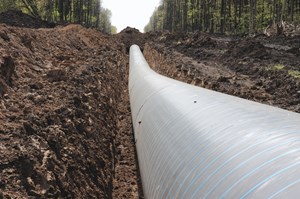Court Rejects Bid to Revive Cancelled U.S. Pipeline Program
BILLINGS, Mont. (AP) — A federal appeals court on Thursday turned down the Trump administration's request to revive a permit program for new oil and gas pipelines, an outcome that industry representatives said could delay more than 70 projects across the U.S. and cost companies up to $2 billion.
The case originated with a challenge by environmentalists to the Keystone XL crude oil pipeline from the oil sands region of Canada to the U.S. It's now affecting oil and gas pipeline proposals across the nation.
The U.S. Army Corps of Engineers permitting program allows pipelines to be built across streams and wetlands with minimal review if they meet certain criteria. Environmental groups contend the program, known as Nationwide Permit 12, leaves companies unaccountable for damage done to water bodies during construction.
Army Corps spokesman Doug Garman said the agency was not commenting because the matter is still in litigation.
Government attorneys, backed by 19 states and numerous industry groups, had argued the cancellation would delay construction of pipelines used to deliver fuel to power plants and other destinations.
U.S. District Judge Brian Morris in Montana said in a pair of recent rulings in the Keystone case that Army Corps officials had failed to adequately consult with wildlife agencies before reauthorizing the permitting program in 2017. Its continued use could cause serious harm to protected species and critical wildlife habitat, he said.
A two-judge panel of the 9th U.S. Circuit Court of Appeals denied an emergency request to block Morris' ruling. They said in a one-page decision that the government, states and industry groups had not demonstrated sufficient harm to justify reviving the program while the case is still pending.
The issue could take months to resolve barring further court intervention.
In the absence of the nationwide permit, companies will have to apply for numerous individual construction permits on lines that sometimes cross hundreds of water bodies. That could cause delays of a year or more on more than 70 pending pipelines, increasing their combined costs by $2 billion, said Paul Afonso, chief legal officer for the American Petroleum Institute.
“It is completely inappropriate that the district court has singled out natural gas and oil companies to cut out of a long- established regulatory process," he said.
Related News
From Archive

- Glenfarne Alaska LNG targets late-2026 construction start for 807-mile pipeline project
- U.S. water reuse boom to fuel $47 billion in infrastructure spending through 2035
- $2.3 billion approved to construct 236-mile Texas-to-Gulf gas pipeline
- Major water pipe break in Puerto Rico hits over 165,000 customers
- Potomac River Tunnel project enters construction phase beneath Washington, D.C.
- Pennsylvania American Water launches interactive map to identify, replace lead water service lines
- Trump's tariffs drive $33 million cost increase for Cincinnati sewer project
- Utah city launches historic $70 million tunnel project using box jacking under active rail line
- Tulsa residents warned after sewer lines damaged by boring work
- Fatal trench collapse halts sewer construction in Massachusetts; two workers hospitalized




Comments